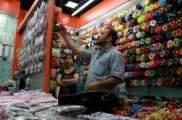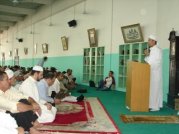Yiwu Arabs

Remove the big neon Chinese characters on the restaurant and shopfront signs and you could be in Dubai.
Dice rattling across backgammon boards, loud Arabic chatter and the sweet smell of shisha smoke fill the humid evening air and a presenter in a dishdasha from one of the Gulf channels looks sternly out from the TV screen mounted on the street.
But this is Yiwu, a city of about two million people - small by Chinese standards - a four-hour train ride south-west of Shanghai.
Entrepreneurial Arab businessmen have poured into Yiwu, sourcing cheap goods in the city's bustling wholesale markets to sell back in their home countries and turning it into a modern Silk Road trade route between China and the Middle East.
Many are young men who are putting down roots in Yiwu, making it home to the biggest Arab population in China. They set up companies to help visitors ship goods back home and send their children to local schools, where they become fluent in Chinese.
"In 2000, there was no Muslim community here at all. Then Arabs as well as Afghans and Pakistanis started coming.
Islam is getting big here now," said Mohammed Abdullah, a 33-year-old Chinese who is imam at the large Yiwu mosque, built four years ago in response to the city's growing Muslim community.
There are few statistics but locally based Arabs said there are several thousand Arabs living permanently in Yiwu and running about 350 small companies, with tens of thousands more visiting each year for periods ranging from just a few days to several months to purchase locally manufactured products. Particularly popular are electronic goods, clothing, beauty products and accessories for cars.
 About 7,000 Muslims worship in his mosque every week, the imam said, most of whom are from overseas. Provision has also been made for a temporary mosque in the Futian Market, the city's biggest market, so Muslims can worship with minimum disruption to their commerce.
About 7,000 Muslims worship in his mosque every week, the imam said, most of whom are from overseas. Provision has also been made for a temporary mosque in the Futian Market, the city's biggest market, so Muslims can worship with minimum disruption to their commerce.
"We give the sermons in a mixture of Chinese and Arabic. The Arabs can speak Chinese pretty well, although few can read or write it. Not so many Chinese speak Arabic," Mr Abdullah said.
One of the first Arabs in China was Asad al Ali, 33, from Baghdad, who arrived in 2000 and now lives with his wife and newborn child in Xixi in Fujian province. He was visiting the Binyang clothing market in downtown Yiwu, checking prices for baby clothes with the Chinese traders manning the small booths. There are about 20 markets in Yiwu, with a total of more than 300,000 kiosks.
"I had no big plan - I just wanted to make money. I had no translator. If I liked something I just bought it and then sold it in Iraq," he said.
"The Chinese people have very good hearts. I've never had a problem here and I have many Chinese friends," said Mr Ali, who speaks fluent Chinese.
Iraqis make up a significant number of the Arabs living in Yiwu. Among them are Qusay Suheib, 22, and Saif Bassam, 20, both from Mosul, who work in shipping.
Mr Suheib joined his father, who had been travelling to China for more than 30 years, in Yiwu three years ago and speaks fluent Chinese. He married his Iraqi wife here six months ago. His sister, Aisha, 8, goes to a private school in Yiwu and speaks, reads and writes Chinese as well as the local Chinese children, he said.
Mr Bassam, an energetic young man dressed in a baseball shirt with an Iraq-shaped medallion hanging over it, arrived six months ago. Both work for Mr Suheib's father.
"I just wanted to get out of Iraq and away from all the problems there," Mr Bassam said, whose job is to organise the shipping containers for goods.
"We are working really hard. In Iraq so much of what you buy is made in China. Maybe one day even the kids will be born and there will be a stamp on them - 'Made in China'," he said.
Mr Suheib and Mr Bassam help such men as Mahmoud Shqerat, a 46-year-old Jordanian from Zarqa, near Amman, who was buying about 30,000 garments and shoes for almost 500,000 yuan (Dh267,350), enough to fill a container that can hold up to 20 tonnes. Shipping from the port of Ningbo to Aqaba costs him about US$2,200 (Dh8,100).
"Yiwu has everything - good, medium and cheap quality," said Mr Shqerat, who travels here six times a year.
Said Mohammed, 23, from Addis Ababa, said he could make profits of about 40 per cent by finding goods in Yiwu. "Some items are twice as cheap here than places like Dubai; that's why I come."
The influx from the Middle East had in turn attracted Chinese Muslims to migrate to Yiwu, Mr Abdullah said, where they found employment as translators helping Arab traders haggle for goods in the city's wholesale markets or as waitresses and even belly-dancers in Arab-run restaurants.
China itself is home to about 20 million Muslims, according to US government estimates. Most are from western provinces, such as Xinjiang.
Mr Suheib and Mr Bassam have visas to work in China. They spend their evenings walking on the pleasant grassy banks of an artificial lake or sitting in the Arab cafes - but they have very different plans for the future.
"I want to marry a Chinese girl and I don't want to go back to Iraq," said Mr Bassam, who said a previous Chinese girlfriend left him because her parents did not want her marrying an Arab.
Mr Suheib, however, does not see his long-term future in China.
"I like China, but I feel best in my home among my people. The first day that Iraq is stable, I'll be back there," he said.
(From: thenational.ae)
>> Return to Yiwu China from Yiwu Arabs
SeeAlso:
Yiwu Hotels Near Futian Market (International Trade City)
NEWS:
12 Oct., 2011:
Having A Company In Yiwu Is Becoming Easier.
22 Sep., 2011:
Yiwu Is Protecting Intellectual Property.
13 Sep., 2011:
Air China Flies from Beijing to Yiwu Directly.
19 Jul., 2011:
Fiji Minister Visited Yiwu.
16 Jul., 2011:
Yiwu Port is Taking Shape.
20 Jun., 2011:
Hong Kong to Yiwu flights 2011.
29 Mar., 2011:
Yiwu Becomes 10th Special Economic Zone in China.
11 Mar., 2011:
New Exhibitions Are on the Way in Yiwu.
20 Feb., 2011:
Labor Shortage after Chinese New Year Holiday in Yiwu China.
02 Feb., 2011:
Total Foreign Companies in Yiwu Reached 3,008 by 2010.
15 Jan., 2011:
Yiwu Manufactures Attended 63 World Top Exhibitions in 2010.
08 Jan., 2011:
Low temperature affects Yiwu electricity power supply.
24 December, 2010:
Yiwu Sells Over 17 Million USD Products Each Day.
23 September, 2010:
Yiwu GDP Reached 4 Billion USD after Q2, 2010.
16 September, 2010:
Brazil-China Commerce Association Visited Yiwu for Invest Opportunities.
11 September, 2010:
Mayor of Parramatta, Australia Visited Yiwu.
16 July, 2009:
Yiwu Customs Opened.